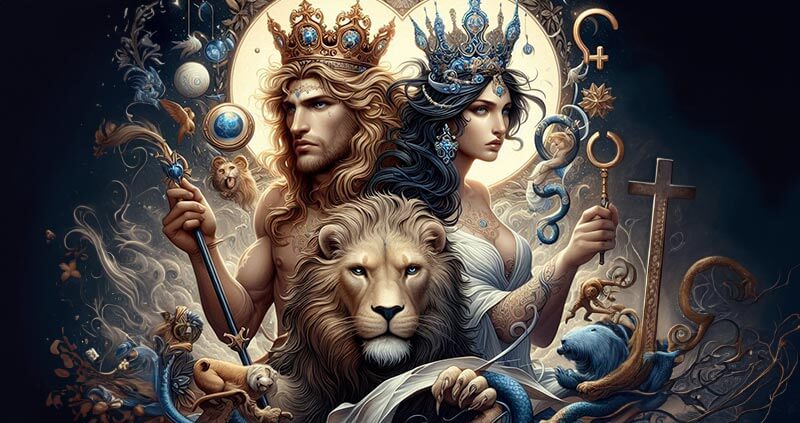Introduction
In the realm of astrology, each zodiac sign carries unique characteristics, energies, and associations. One intriguing aspect that often sparks curiosity is the gender classification of these celestial symbols. Among the twelve signs, Leo stands out as a particularly interesting case. So, is Leo feminine or masculine? This question delves into the heart of astrological tradition and modern interpretations, offering insights into the complex nature of cosmic energies.
Masculine signs, such as Aries, Leo, and Sagittarius, are associated with the fire and air elements and embody a direct, action-oriented energy. Fire and air signs are characterized by active, outward energy that seeks to engage with the world.
On the other hand, feminine signs, such as Taurus, Cancer, and Pisces, are associated with the earth and water signs and embody a receptive, intuitive energy. The earth element, in particular, is linked to practicality, stability, and structure, playing a crucial role in laying down foundations and building reliable systems.
Understanding Zodiac Signs
Understanding zodiac signs is essential to grasping the complexities of astrology. The 12 zodiac signs are categorized into four elements: fire, earth, air, and water. Each sign has its unique characteristics and traits, influenced by its element and planetary ruler. The zodiac signs are also divided into masculine and feminine signs, representing different types of energy. Masculine signs, such as Aries, Leo, and Sagittarius, are associated with the fire and air elements and embody a direct, action-oriented energy. These signs are known for their assertiveness, dynamism, and outward focus. On the other hand, feminine signs, such as Taurus, Cancer, and Pisces, are associated with the earth and water elements and embody a receptive, intuitive energy. These signs are characterized by their nurturing, protective, and inward-focused nature. Understanding these classifications helps us appreciate the diverse energies that each zodiac sign brings to the cosmic table.
The Traditional View: Leo as a Masculine Fire Sign
Historical Classification
Traditionally, astrology has classified zodiac signs into two distinct categories: feminine and masculine. This binary system has roots in ancient astrological practices and philosophies.
The Masculine Energy Traits of Leo
In classical astrology, Leo is generally considered a masculine . This classification is based on several factors:
-
Element Association: Leo is a fire sign, and fire is traditionally seen as a masculine element.
-
Planetary Ruler: The Sun, Leo’s ruling celestial body, is often associated with masculine energy.
-
Active Energy: Leo is known for its outgoing, assertive, and dynamic nature, traits typically labeled as masculine in traditional astrology. As one of the fixed signs, Leo also represents stability and persistence, embodying reliability and serving as a societal pillar.
Masculine zodiac signs, such as Aries, Leo, and Sagittarius, are associated with the fire and air elements and embody a direct, action-oriented energy.
The Sun’s Influence on Leo’s Masculinity
The Sun plays a crucial role in defining Leo’s energy:
-
Leadership qualities
-
Confidence and self-expression
-
Desire for recognition and attention
These solar-influenced traits align with traditional concepts of masculinity in many cultures. Similarly, Capricorn, although a feminine zodiac sign, exhibits masculine traits such as assertiveness and ambition due to its ruling by the masculine planet Saturn.
Modern Perspectives: Beyond Binary Classifications
Evolving Understanding of Gender in Astrology
As our understanding of gender evolves, so does the interpretation of astrological concepts. Modern astrologers often take a more nuanced approach to the question “is Leo feminine or masculine?”
Balancing Energies in Leo
Contemporary astrology recognizes that each sign contains a blend of energies:
-
Assertiveness (traditionally masculine) balanced with nurturing qualities (traditionally feminine)
-
Self-confidence complemented by sensitivity
-
Leadership abilities alongside collaborative tendencies
The Spectrum of Leo Energy
Rather than a strict binary, Leo’s energy can be seen as a spectrum:
-
Yang-dominant energy (traditionally masculine)
-
Expressive and creative forces
-
Nurturing and protective instincts (traditionally feminine)
Leo’s Feminine Energy Aspects
While traditionally classified as masculine, Leo exhibits several traits that align with feminine energy:
Nurturing Leadership
Leo’s protective nature often manifests in a nurturing form of leadership:
-
Guiding and mentoring others
-
Creating supportive environments for growth
-
Encouraging self-expression in others
Emotional Expressiveness
Contrary to stereotypical masculine stoicism, Leo is known for its emotional openness:
-
Passionate expressions of feelings
-
Dramatic and theatrical displays of emotion
-
Deep capacity for love and affection
Creativity and Artistry
Leo’s creative energy aligns with traditionally feminine attributes:
-
Artistic expression
-
Appreciation for beauty and aesthetics
-
Intuitive and imaginative thinking
The Role of Feminine Zodiac Signs
Feminine zodiac signs play a crucial role in maintaining balance and harmony in the universe. These signs, which include Taurus, Cancer, Virgo, Scorpio, Capricorn, and Pisces, are associated with the earth and water elements and embody a receptive, intuitive energy. Feminine signs are known for their nurturing and protective qualities, often prioritizing the needs of others over their own. They possess a deep connection to their emotions and the emotions of those around them, making them highly intuitive and sensitive. By understanding the role of feminine zodiac signs, we can gain a deeper appreciation for the importance of receptivity, intuition, and nurturing in our lives. These signs remind us of the value of empathy, care, and emotional intelligence, which are essential for creating supportive and harmonious environments.
The Impact of Cultural Context
Cultural Variations in Gender Perception
The interpretation of whether Leo is feminine or masculine can vary across cultures:
-
Western astrology vs. Eastern astrological systems
-
Historical changes in gender roles and their reflection in astrological interpretation
-
Modern, non-binary approaches to astrology
Leo in Different Astrological Traditions
-
Vedic Astrology: Leo’s perception in Indian astrological practices
-
Chinese Astrology: The concept of yin and yang as applied to Leo’s energy
-
Modern Western Astrology: Evolving interpretations of Leo’s gender identity
Navigating the Zodiac
Navigating the zodiac can be a complex and challenging task, but it can also be a rewarding and enlightening experience. To navigate the zodiac, it’s essential to understand the different elements and qualities associated with each sign. For example, fire signs like Aries, Leo, and Sagittarius are known for their passion, energy, and enthusiasm. They are driven by a desire to take action and make things happen. Earth signs like Taurus, Virgo, and Capricorn are known for their practicality, stability, and grounded nature. They excel in creating structure and bringing ideas into tangible form. Air signs like Gemini, Libra, and Aquarius are known for their intellectual curiosity, social skills, and ability to communicate effectively. They thrive on mental stimulation and interpersonal connections. Water signs like Cancer, Scorpio, and Pisces are known for their emotional depth, intuition, and sensitivity. They have a profound understanding of the emotional undercurrents that influence human behavior. By understanding these different elements and qualities, we can gain a deeper understanding of ourselves and the world around us, allowing us to navigate the zodiac with greater insight and awareness.
Practical Applications: Understanding Leo Energy
Personal Growth and Self-Understanding
Exploring the question “is Leo feminine or masculine?” can lead to deeper self-awareness:
-
Recognizing and balancing different aspects of one’s personality
-
Embracing both assertive and nurturing qualities
-
Developing a holistic approach to personal energy
Relationships and Compatibility
Understanding Leo’s energy blend can enhance relationship dynamics:
-
Appreciating the multifaceted nature of Leo individuals
-
Recognizing complementary energies in partnerships
-
Fostering balanced and harmonious interactions
Mastering Your Leo Destiny
Mastering your Leo destiny requires a deep understanding of the Leo sign and its associated energies. As a fire sign, Leo is known for its passion, energy, and creativity. Leos are natural-born leaders, with a strong desire to express themselves and make their mark on the world. To master your Leo destiny, it’s essential to tap into your inner creativity and confidence. This can involve pursuing your passions and interests, taking risks, and embracing your unique individuality. Leos thrive when they are in the spotlight, using their charisma and charm to inspire and lead others. It’s also important to develop your leadership skills and learn to work with others to achieve your goals. By mastering your Leo destiny, you can unlock your full potential and live a life that is true to who you are. Embrace your fiery spirit, and let your radiant energy shine brightly in all that you do.
The Astrological Perspective on Gender Fluidity
Modern Astrology’s Approach to Gender
Contemporary astrologers often view gender in celestial bodies as fluid and complex:
-
Moving beyond strict masculine/feminine classifications
-
Recognizing the spectrum of energies within each sign
-
Adapting interpretations to reflect modern understanding of gender
Leo’s Role in Challenging Gender Norms
Leo’s unique blend of traits offers an opportunity to challenge traditional gender expectations:
-
Combining strength with sensitivity
-
Balancing leadership with emotional intelligence
-
Embracing both spotlight-seeking and nurturing tendencies
-
Is Leo considered a masculine or feminine sign in traditional astrology? Traditionally, Leo is classified as a masculine sign in astrology.
-
Can Leo exhibit feminine traits despite being traditionally masculine? Yes, Leo can display many traits traditionally associated with feminine energy, such as nurturing leadership and emotional expressiveness.
-
How does the Sun’s influence affect Leo’s gender classification? The Sun, Leo’s ruling planet, is often associated with masculine energy, contributing to Leo’s traditional classification as a masculine sign.
-
Does modern astrology still use gender classifications for zodiac signs? While many modern astrologers acknowledge traditional classifications, there’s a growing trend to view zodiac energies as more fluid and complex than strictly masculine or feminine.
-
How can understanding Leo’s energy blend help in personal development? Recognizing Leo’s diverse traits can help individuals embrace a more balanced approach to their own energies, fostering personal growth and self-awareness.
-
Are there cultural differences in how Leo’s gender is perceived in astrology? Yes, different astrological traditions and cultural contexts may interpret Leo’s energy and gender associations differently.
-
How does Leo’s gender classification affect compatibility in relationships? While traditional gender classifications can offer insights, modern astrology emphasizes the importance of balancing energies in relationships rather than strict gender-based compatibility.
-
Can Leo’s energy be considered gender-fluid in modern astrological interpretations? Many contemporary astrologers view Leo’s energy as a spectrum that includes both traditionally masculine and feminine traits, aligning with more fluid concepts of gender.
Conclusion
The question “is Leo feminine or masculine?” opens up a fascinating exploration of astrological tradition, modern interpretations, and evolving understandings of gender. While traditionally classified as masculine, Leo embodies a complex blend of energies that challenge simple categorizations. This fiery sign’s unique combination of assertiveness, creativity, and nurturing qualities demonstrates the fluidity and depth of celestial energies.
As we continue to evolve our understanding of gender and energy in both societal and astrological contexts, Leo stands as a powerful example of how traditional classifications can be reimagined. Whether viewed through the lens of classical astrology or modern interpretations, Leo’s energy remains a vibrant, multifaceted force that transcends simple gender binaries.
Ultimately, the rich tapestry of Leo’s traits reminds us that true strength lies in embracing all aspects of our nature, regardless of traditional gender associations. In doing so, we unlock the full potential of Leo’s radiant, life-affirming energy, paving the way for a more inclusive and nuanced approach to astrology and self-understanding.











